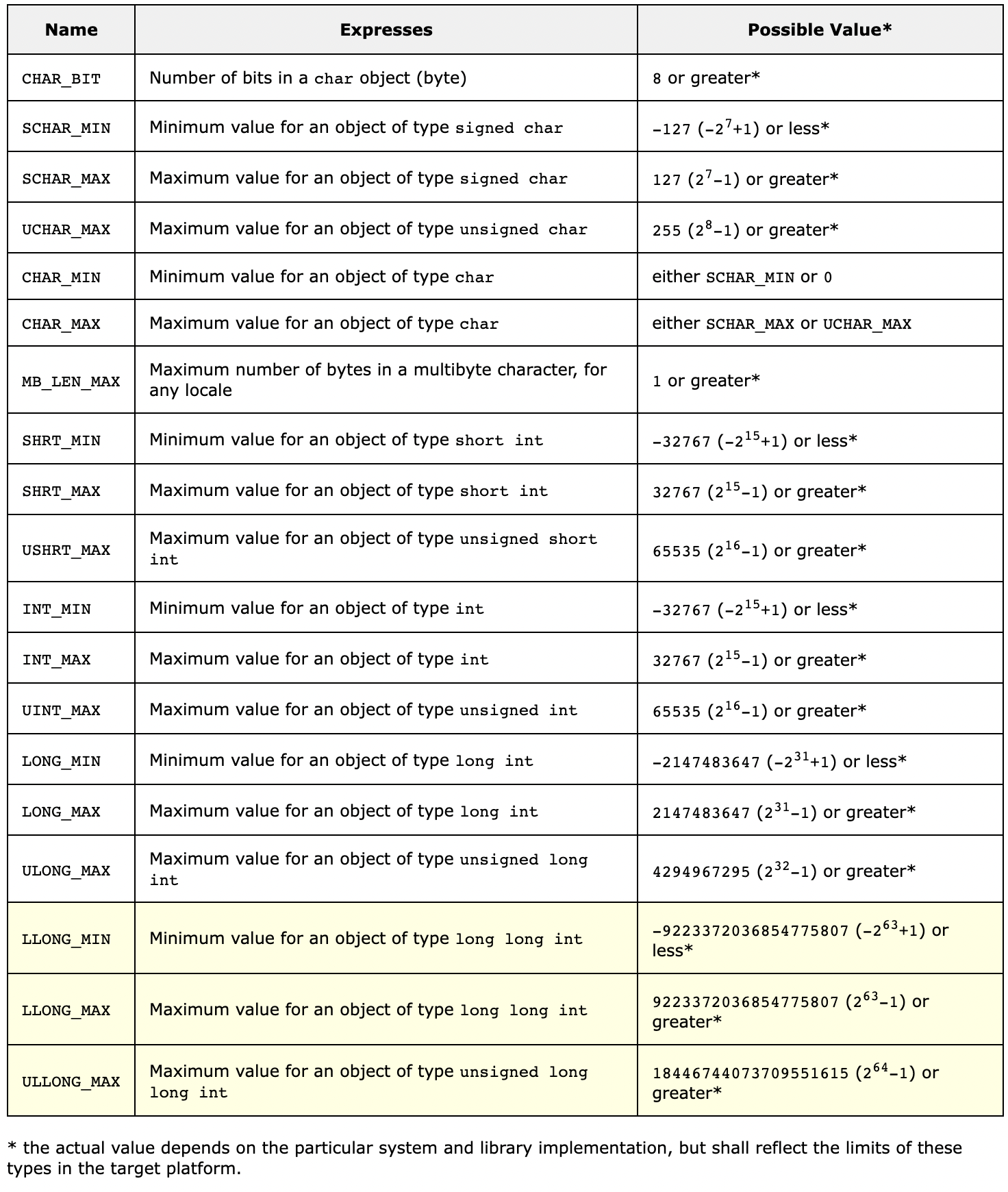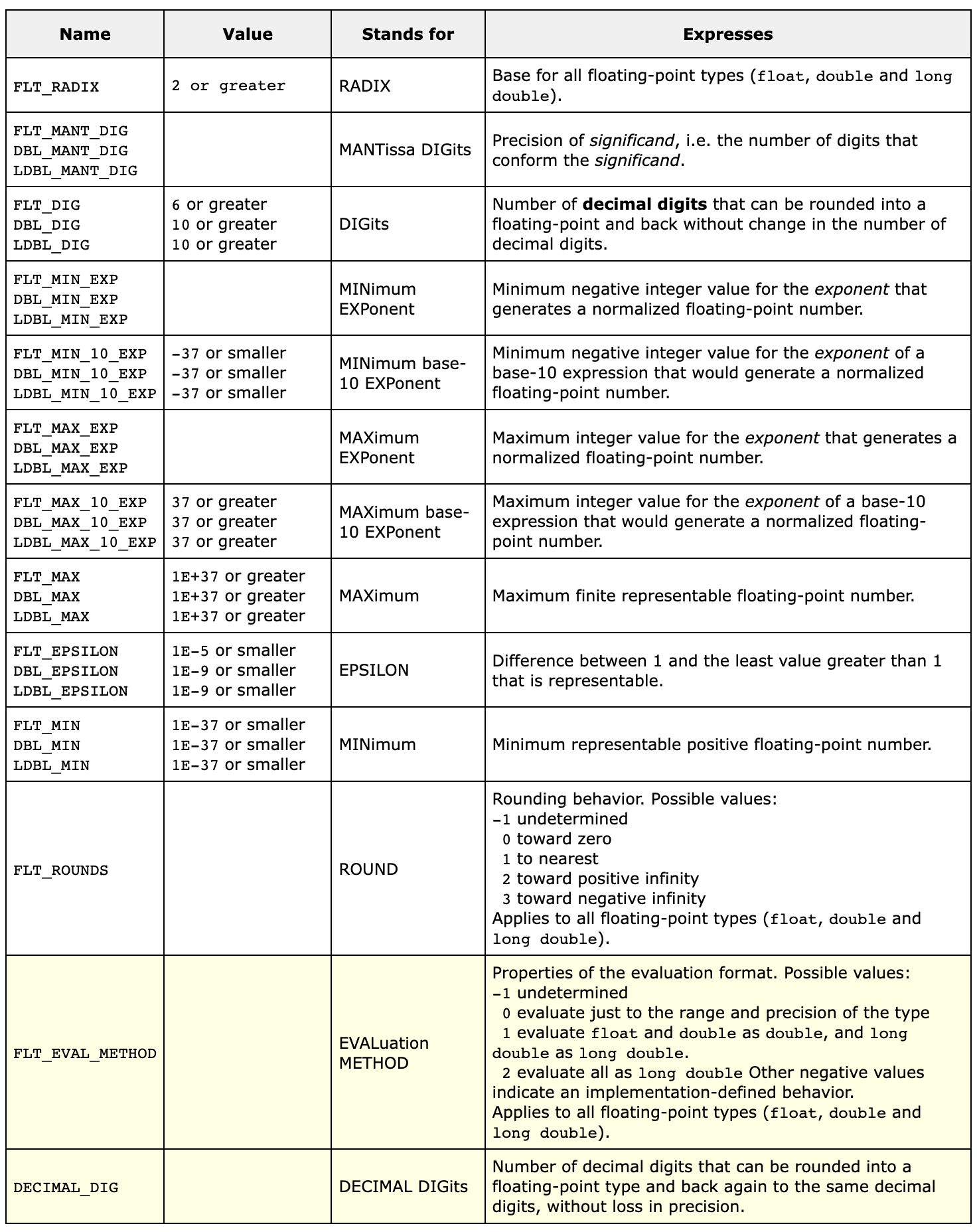Modifiers in C++
Modifiers in C++
Modifiers in C++ are extensions to existing data types and can change the storing capacity and behaviour of the data types and variables. These modifiers precede the data types like int, char, float etc.

Some modifiers are –
- long
- signed
- unsigned
- short
Modifiers Details
These modifiers also modify the range and size of of the data types that they are preceding. The below list gives you an idea on the same – [table id=551 /] The sizes of the variables might be different for various compilers, what we have given are general sizes that are useful for various competitive examinations.- int – can be preceded with long, signed, unsigned, short
- char – can be preceded with signed and unsigned
Run
#include <iostream>
using namespace std;
int main() {
cout << "Size of char : " << sizeof(char) << endl;
cout << "Size of int : " << sizeof(int) << endl;
cout << "Size of short int : " << sizeof(short int) << endl;
cout << "Size of long int : " << sizeof(long int) << endl;
cout << "Size of long int : " << sizeof(unsigned long int) << endl;
cout << "Size of float : " << sizeof(float) << endl;
cout << "Size of double : " << sizeof(double) << endl;
cout << "Size of wchar_t : " << sizeof(wchar_t) << endl;
return 0;
}
The following will be the output of the code –
Size of char : 1 Size of int : 4 Size of short int : 2 Size of long int : 8 Size of long int : 8 Size of float : 4 Size of double : 8 Size of wchar_t : 4
If you use just the modifier followed by the variable, in C++ the assignment is understood for int, for unsigned, short or long
For example writing the following means the same thing and it implies that the variable is an unsigned int type.
unsigned x; unsigned int y;
C++ Program to Display Limits
This covers char, int with various modifiers
Run
#include <iostream>
#include <limits.h>
using namespace std;
int main ()
{
// characters
cout << "CHAR_BIT : " << CHAR_BIT << endl;
cout << "CHAR_MAX : " << CHAR_MAX << endl;
cout << "CHAR_MIN : " << CHAR_MIN << endl;
cout << "SCHAR_MAX : " << SCHAR_MAX << endl;
cout << "SCHAR_MIN : " << SCHAR_MIN << endl;
cout << "UCHAR_MAX : " << UCHAR_MAX << "\n" << endl;
// integers
cout << "SHRT_MAX : " << SHRT_MAX << endl;
cout << "SHRT_MIN : " << SHRT_MIN << endl;
cout << "USHRT_MAX : " << USHRT_MAX << endl;
cout << "INT_MAX : " << INT_MAX << endl;
cout << "INT_MIN : " << INT_MIN << endl;
cout << "UINT_MAX : " << UINT_MAX << "\n" << endl;
cout << "LONG_MAX : " << LONG_MAX << endl;
cout << "LONG_MIN : " << LONG_MIN << endl;
cout << "ULONG_MAX : " << ULONG_MAX << "\n" << endl;
cout << "LLONG_MAX : " << LLONG_MAX << endl;
cout << "LLONG_MIN : " << LLONG_MIN << endl;
cout << "ULLONG_MAX : " << ULLONG_MAX << endl;
return 0;
}
Output
CHAR_BIT : 8
CHAR_MAX : 127
CHAR_MIN : -128
SCHAR_MAX : 127
SCHAR_MIN : -128
UCHAR_MAX : 255
SHRT_MAX : 32767
SHRT_MIN : -32768
USHRT_MAX : 65535
INT_MAX : 2147483647
INT_MIN : -2147483648
UINT_MAX : 4294967295
LONG_MAX : 9223372036854775807
LONG_MIN : -9223372036854775808
ULONG_MAX : 18446744073709551615
LLONG_MAX : 9223372036854775807
LLONG_MIN : -9223372036854775808
ULLONG_MAX : 18446744073709551615
C++ Program to Display Limits
This covers float, double, long double
Run
#include <iostream>
#include <limits.h>
using namespace std;
int main ()
{
// Max possible positive value representable
cout << "Max Float : " << FLT_MAX << endl;
cout << "Max Double : " << DBL_MAX << endl;
cout << "Max Long Double : " << LDBL_MAX << endl;
cout << "\n\n";
// Min possible positive value representable
// postive value nearest to zero in decimals
cout << "Min Float : " << FLT_MIN << endl;
cout << "Min Double : " << DBL_MIN << endl;
cout << "Min Long Double : " << LDBL_MIN << endl;
cout << "\n\n";
// Max possible negative value representable
cout << "-(Max Float) : " << -FLT_MAX << endl;
cout << "-(Max Double) : " << -DBL_MAX << endl;
cout << "-(Max Long Double) : " << -LDBL_MAX << endl;
cout << "\n\n";
// Min possible negative value representable
// negative value nearest to zero decimals
cout << "-(Min Float) : " << -FLT_MIN << endl;
cout << "-(Min Double) : " << -DBL_MIN << endl;
cout << "-(Min Long Double) : " << -LDBL_MIN << endl;
return 0;
}

Output
Max Float : 3.40282e+38
Max Double : 1.79769e+308
Max Long Double : 1.18973e+4932
Min Float : 1.17549e-38
Min Double : 2.22507e-308
Min Long Double : 3.3621e-4932
-(Max Float) : -3.40282e+38
-(Max Double) : -1.79769e+308
-(Max Long Double) : -1.18973e+4932
-(Min Float) : -1.17549e-38
-(Min Double) : -2.22507e-308
-(Min Long Double) : -3.3621e-4932
We can write a program to also display these limits side by side.
The program for char/int in various modifiers is below –
Run
#include <iostream>
#include <limits.h>
using namespace std;
int main ()
{
// characters
cout << "Char : " << "(" << CHAR_MIN << ", " << CHAR_MAX << ")" << endl;
cout << "Signed Char : " << "(" << SCHAR_MIN << ", " << SCHAR_MAX << ")" << endl;
cout << "UnSigned Char : " << "(" << "0" << ", " << UCHAR_MAX << ")" << endl;
cout << "\n\n";
// integers
cout << "Short : " << "(" << SHRT_MIN << ", " << SHRT_MAX << ")" << endl;
cout << "Unsigned Short : " << "(" << "0" << ", " << USHRT_MAX << ")" << endl;
cout << "Int : " << "(" << INT_MIN << ", " << INT_MAX << ")" << endl;
cout << "Unsigned Int : " << "(" << "0" << ", " << UINT_MAX << ")" << endl;
cout << "Long Int : " << "(" << LONG_MIN << ", " << LONG_MAX << ")" << endl;
cout << "Unsigned Long Int : " << "(" << "0" << ", " << ULONG_MAX << ")" << endl;
cout << "Long Long Int : " << "(" << LLONG_MIN << ", " << LLONG_MAX << ")" << endl;
cout << "Unsigned Long Long Int : " << "(" << "0" << ", " << ULLONG_MAX << ")" << endl;
return 0;
}
Output
Char : (-128, 127) Signed Char : (-128, 127) UnSigned Char : (0, 255) Short : (-32768, 32767) Unsigned Short : (0, 65535) Int : (-2147483648, 2147483647) Unsigned Int : (0, 4294967295) Long Int : (-9223372036854775808, 9223372036854775807) Unsigned Long Int : (0, 18446744073709551615) Long Long Int : (-9223372036854775808, 9223372036854775807) Unsigned Long Long Int : (0, 18446744073709551615)
We can write a program to also display these limits side by side.
The program for float/double/long double in various modifiers is below –
Run
#include <iostream>
#include <limits.h>
using namespace std;
int main ()
{
// Max/min possible positive value representable
cout << "Float Positive Range : " << "(" << FLT_MIN << ", " << FLT_MAX << ")" << endl;
cout << "Double Positive Range : " << "(" << DBL_MIN << ", " << DBL_MAX << ")" << endl;
cout << "Long Double Positive Range : " << "(" << LDBL_MIN << ", " << LDBL_MAX << ")" << endl;
cout << "\n\n";
// Max/min possible negaive value representable
cout << "Float Negative Range : " << "(" << -FLT_MAX << ", " << -FLT_MIN << ")" << endl;
cout << "Double Negative Range : " << "(" << -DBL_MAX << ", " << -DBL_MIN << ")" << endl;
cout << "Long Double Negative Range : " << "(" << -LDBL_MAX << ", " << -LDBL_MIN << ")" << endl;
return 0;
}
Output
Float Positive Range : (1.17549e-38, 3.40282e+38) Double Positive Range : (2.22507e-308, 1.79769e+308) Long Double Positive Range : (3.3621e-4932, 1.18973e+4932) Float Negative Range : (-3.40282e+38, -1.17549e-38) Double Negative Range : (-1.79769e+308, -2.22507e-308) Long Double Negative Range : (-1.18973e+4932, -3.3621e-4932)
Prime Course Trailer
Related Banners
Get PrepInsta Prime & get Access to all 200+ courses offered by PrepInsta in One Subscription
Get over 200+ course One Subscription
Courses like AI/ML, Cloud Computing, Ethical Hacking, C, C++, Java, Python, DSA (All Languages), Competitive Coding (All Languages), TCS, Infosys, Wipro, Amazon, DBMS, SQL and others






Easy but in deep
❤️❤️